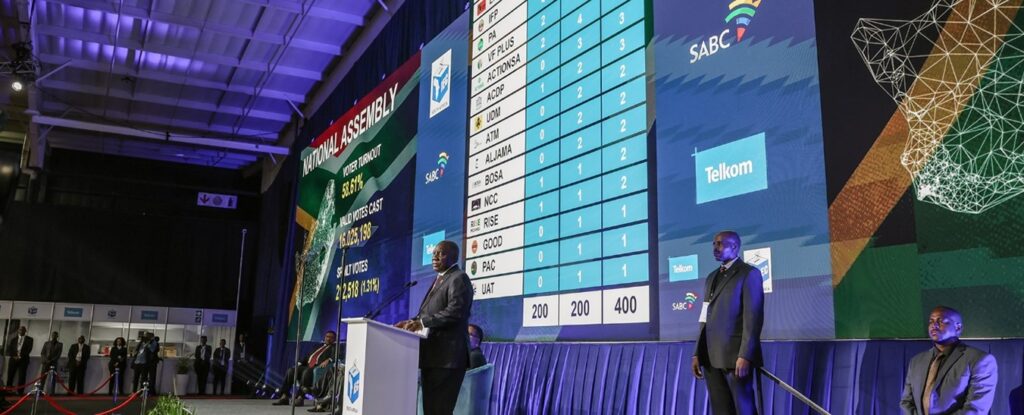The African National Congress is no longer the dominant party in South African politics. They managed to get 159 seats in the National Assembly. The have entered into negotiations with other political parties to form a government.
Embarking into unchartered territory for the still young democracy, President Cyril Ramaphosa has said the ANC will seek to form a government of national unity. Coalition scenarios are likely to revolve around the “big four” parties, the ANC, which garnered 40.2 percent of the votes, the new MK party of former President Jacob Zuma, with 14.6 percent, and the Economic Freedom Fighters (EFF) with 9.5 %. With each party advocating distinctly different policies and ideologies, the composition of the new government will directly shape South Africa’s trajectory. For a government of national unity to be stable and deliver for citizens will require compromises and inter-party confidence building along the lines of President Nelson Mandela’s Government of National Unity, which compromises all of the ANC’s political rivals, including the National Party, following the first competitive multiparty elections in 1994.(Africa Centre for Strategic Studies)
Negotiating for a national unity government, promises to be no easy task. The four major political parties have deeply differing views when it comes to determining what is in the country’s best interests. Not all of them have the same goals, or have similar beliefs on how the country is going to be run. The DA for example tends to be more pro-business and free enterprise, the EFF party is in favour of nationalising the mines and the Reserve Bank and taking land from those of European descent without compensation, while MK seems to want the former but not the latter. uMkhunto We Sizwe Party (MK) is a party that is still deeply on the left while the EFF is even further. If a government that included the EFF, ANC, the MK and the DA were to take over it may not last long and a new general election may have to be called forth.
The ANC has cut an image of a humbled party aware of its errors and wiling to engage in what many are calling “talks-about-talks,” a term that was used to describe the pre-negotiation engagements between the ANC and apartheid regime. The challenges of building a government of national unity are formidable, however. While EFF leader Julius Malema has singled out the ANC as the one party we can work with,” he views the EFF and MK party as “relatives with no policy or ideological differences.” In addition to being products of the ANC’s factional battles, they represent constituencies that feel aggrieved with the party’s failure to implement the resolutions of its 52nd National Conference in 2007, Its most radical policy programme of action, that includes land expropriation. Their respective policy programmes are built in large part on those resolutions. Between the MK, and the EFF and MK party as “relatives with no policy or ideological differences.” (Africa Centre for Strategic Studies)
Ramaphosa despite being the initiator of forming the GNU could be the one to lose the most from its formation. The MK party led by Zuma won’t recognise Ramaphosa’s authority over the GNU. The GNU could dissolve itself within the first few months of its formation, leading to a new general election with the parties contesting against each other. Zuma doesn’t care about any form of unity so long as he can see to it that Ramaphosa resigns from the helm of the Unity Government and is replaced by Deputy President Paul Mashatile. The EFF may support that but the same can’t be said of the DA. It is odd though that the EFF will be willing to work with the MK when Malema and his followers were so determined to see Zuma ousted when he was at the head of the ANC.
The ANC is at its weakest now and with the MK it is unclear if they can deliver. The idea that Zuma, the MK and the EFF are in the role of king makers is alarming.
A government of national unity, which ANC officials said is the first option on the table, evokes South Africa’s transition from apartheid’s white minority rule to a democracy in 1994. Then, new President Nelson Mandela brought political opponents – including the last apartheid leader – into his first government to foster unity in a fractured country. While there was a remarkable act of reconciliation by Mandela, the ANC’s hand has been forced this time after last week’s election removed its 30-year majority and ensured it has to work with others to form a government. ANC had held a comfortable majority ever since the end of apartheid, but won just 40% majority of the vote in this election, although it remains the largest party. (AP News)
The ANC was bound to lose its majority at some point in time. That is the way of democracy. Ramaphosa would have made an excellent president if he stood firm. But now he has entered into a GNU that will be like entering a nest of vipers. In terms leadership he made several mistakes in his conduct as well as the running of the country. However, let it not be forgotten that Zuma did much worse during his tenure. The fact that Zuma backed a rival party of the ANC and now that party gained a significant number of seats in parliament is disturbing. Zuma is not in tune would reality. This was shown by his time in the Union Buildings when he manipulated key ministries in the government to give tenders to his friends the Gupta brothers.
Has the rest of South Africa forgotten that? Although we have a precedent for a GNU in the presidency of the late Nelson Mandela. Ramaphosa is dealing with a pack of wolves.
Al Jazeera News Channel has been banned in the Zionist State of Israel with in its territory. But they are trying their best to expose wrongdoing from across the border.
Netanyahu must immediately send a negotiating team to Egypt to finalize a deal with Palestinian factions in Gaza, says Yair Lapid (Leader of the Israeli Opposition). “Netanyahu should send the negotiating delegation to Cairo tonight,” the Israeli newspaper Yedioth Ahronoth quoted Lapid as saying. “They must not return with concluding a deal and releasing the hostages. There is no other mission, nothing else to do. There is no such thing as victory without reaching an agreement and releasing the hostages.” (Al Jazeera) For years, Israel and Turkey have been crucial trade partners. However, the Turkish government has demanded a halt to the war in Gaza that’s killed nearly 35,000 Palestinians in seven months. Last month, Turkish President Recep Tayyip Erdogan condemned Israel’s decision a total trade ban until Israel agrees to a ceasefire. But how will this affect the economies of both countries? (Al Jazeera)
Article written by:
Yacoob Cassim
Journalist at Radio Al Ansaar






